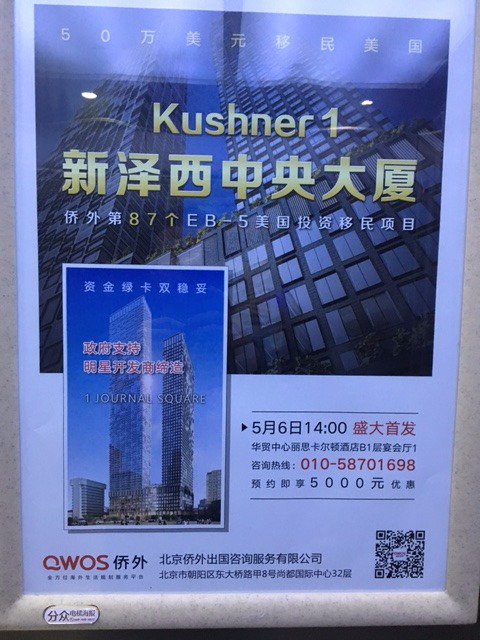By JAVIER C. HERNÁNDEZ

Jared Kushner’s sister Nicole Meyer (third from left) urged wealthy Chinese in Shanghai on May 7 to invest in a Kushner Companies luxury apartment complex in New Jersey.
BEIJING — The tip came in the form of an advertisement posted in the elevator of a Beijing apartment building.
“New Jersey Central Tower,” it said above a rendering of a gleaming housing complex.
“Government supports, star family builds.”
The “star family” referred to relatives of Jared Kushner, Trump's son-in-law and senior adviser.
The “star family” referred to relatives of Jared Kushner, Trump's son-in-law and senior adviser.
The ad gave the details of a meeting at the Ritz-Carlton Hotel in Beijing where investors would learn how they could obtain permanent residence in the United States by investing $500,000 in a project called “Kushner1.”
On Saturday, May 6, I showed up at a ballroom in the Ritz-Carlton, doing my best to blend in with a crowd of Chinese investors.
After about a half-hour, the keynote speaker took the stage: Nicole Meyer, Kushner’s sister and a leader of Kushner Companies, the family real estate business.
I listened attentively, jotting down her opening words: “This project means a lot to me and my entire family.”
On Saturday, May 6, I showed up at a ballroom in the Ritz-Carlton, doing my best to blend in with a crowd of Chinese investors.
After about a half-hour, the keynote speaker took the stage: Nicole Meyer, Kushner’s sister and a leader of Kushner Companies, the family real estate business.
I listened attentively, jotting down her opening words: “This project means a lot to me and my entire family.”
But about a minute into her speech, a public relations executive blocked my view.
“This is a private event,” she said.
“This is a private event,” she said.
“I have to let you go. We don’t want to make a scene.”
I noted that the meeting had been publicly advertised. (A colleague in the Beijing bureau of The Times, Jonathan Ansfield, had spotted the notice inside the compound where he lives.)

But it was clear that the handlers were going to block me from hearing the rest of Meyer’s remarks.
I noted that the meeting had been publicly advertised. (A colleague in the Beijing bureau of The Times, Jonathan Ansfield, had spotted the notice inside the compound where he lives.)

But it was clear that the handlers were going to block me from hearing the rest of Meyer’s remarks.
I left the ballroom, but my colleague Cao Li, a journalist in the Beijing bureau of The Times, managed to stay inside for a few more minutes.
Outside the ballroom, a team of about half a dozen public relations executives and security officials grew hostile, threatening to take us into a private room.
Outside the ballroom, a team of about half a dozen public relations executives and security officials grew hostile, threatening to take us into a private room.
They followed us throughout the hotel, trying to discourage investors from speaking out.
As journalists in China, we are accustomed to dealing with harassment.
As journalists in China, we are accustomed to dealing with harassment.
But we don’t typically encounter bullying at events where American companies hold court.
After the meeting, we ran after Meyer, asking whether she worried her business activities in China might create ethical issues for her brother.
After the meeting, we ran after Meyer, asking whether she worried her business activities in China might create ethical issues for her brother.
She wouldn’t answer but tried to calm down her irritated husband, Joseph Meyer, chairman and publisher of Observer Media, who shouted three times, “Please leave us alone!”
Later that evening, we broke news that Meyer had dropped her brother’s name and his White House role during her sales pitch at the Ritz-Carlton.
Later that evening, we broke news that Meyer had dropped her brother’s name and his White House role during her sales pitch at the Ritz-Carlton.
In the days that followed, Kushner Companies apologized; U.S. senators called for an end to the investor visa program that the company was using; and the mayor of Jersey City, N.J., where the housing development is expected to be built, said he opposed tax breaks for the company.
By Friday, Kushner Companies seemed to have grown tired of the controversy.
By Friday, Kushner Companies seemed to have grown tired of the controversy.
The company announced that Meyer and other executives would leave China early, withdrawing from the rest of their roadshow.

